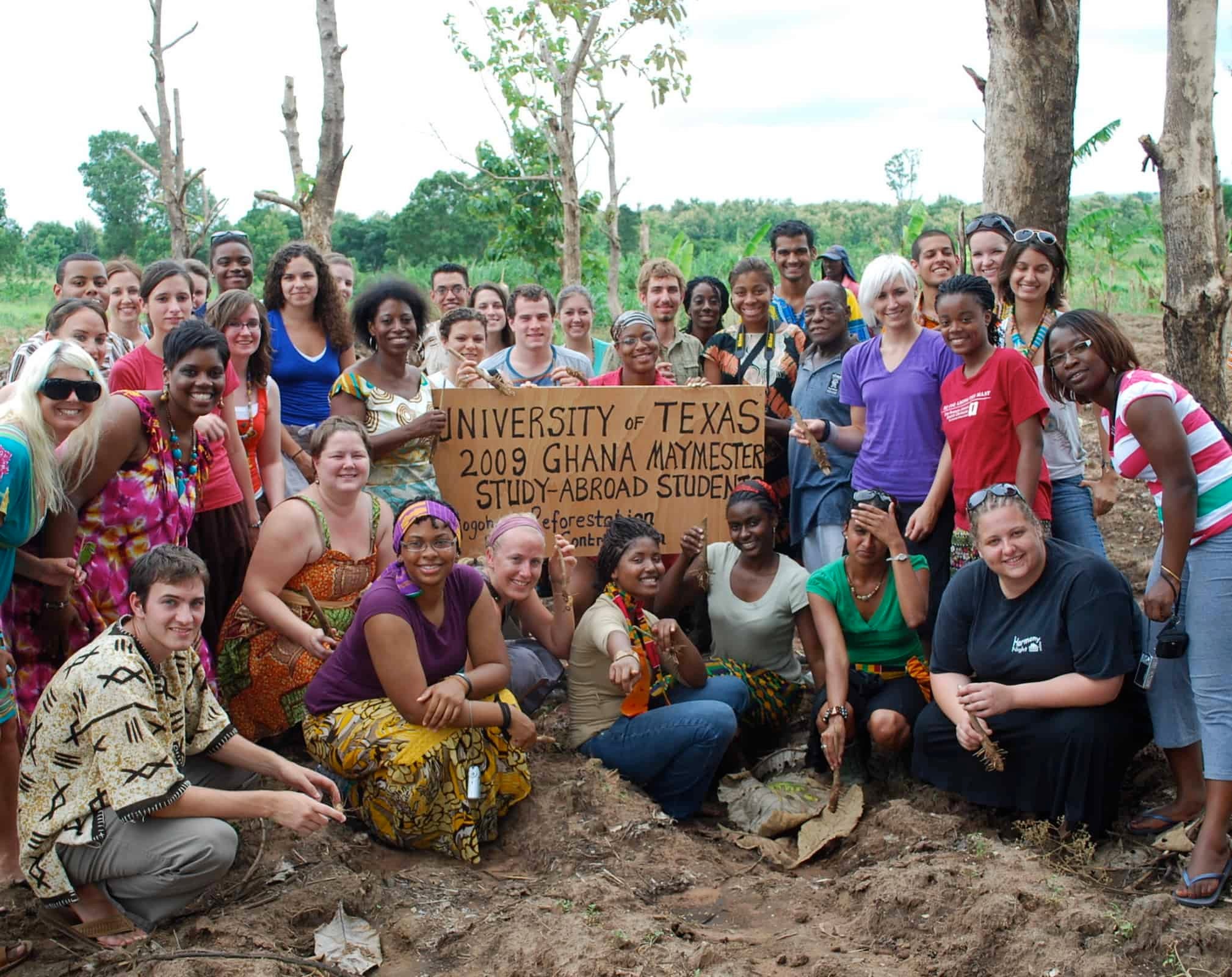As part of the University’s 2010 Maymester course, “Ghana: Community and Social Development,” offered by School of Social Work faculty member Dr. Dorie Gilbert, 22 University students are in Ghana supporting the next steps of a reforestation project in the village of Agogo to ensure the sustainability of the work initiated by students in the Maymester course last year. They plan to visit Agogo to plant more trees and assist Nana Akuoko Sarpong, the Omanhene (Regional Chief) of the Agogo Traditional Area of Ashanti, in his efforts to protect the natural landscape of Ghana.
Deforestation has been a major concern in Ghana for years. Since 1981, the annual rate of deforestation in Ghana has been 2% for each year, claiming an enormous toll through environmental damage and economic deterioration. Approximately 37% of Ghana’s land use is forest and woodland. Ghana’s tropical rain forest area is now just 25% of its original size. The rate of deforestation has increased by 50% over the last ten years, according to the UN Food and Agriculture Organization (FAO). The main causes of forest loss in Ghana include: timber trade, clearing forest for cocoa, and firewood.
The government has taken a series of measures to cope with deforestation, including a ban on all exports of raw logs. In addition, Ghana has set aside 16% of its total area of forest land for wildlife and plant reserves, and has restricted logging licenses. However, Chief Sarpong has taken on reforestation as his personal legacy, devoting his time and resources over the past 15 years to restore the Ashanti area to the rainforest he once experienced as a young boy. Sarpong has been praised internationally for his tree farm and reforestation projects. The farm, which currently has over 3, 200 hectares under cultivation, employs over 200 women, who grow food crops to enhance their income.

Since 2007, Professor Gilbert has visited Chief Sarpong several times as she planned the Maymester program and recalls the chief’s immense pride in tree planting project. “Upon entering the chief’s palace for the first time, I was greeted warmly and then immediately asked if I had noticed the newly planted trees along the entrance to the village” Gilbert recalls. This is an excellent example of community-driven development that students not only learn about but participate in firsthand.”
Following the tree-planting, students were received in royal fashion by the Omanhene’s court, including the chief’s governing equal, the regional Queen Mother. Students also enjoyed a lecture by the Chief followed by a question and answer session which touched on his views of local and national governance as well as the country’s current state of affairs.

Chief Nana Sarpong also utilizes the farm to undertake bee-keeping and fish farming. Through Sarpong’s efforts, the village youth have also started the export of organic honey to the U. S. In 2008, Nana Sarpong and Citrix Systems, a computer company in Ft. Lauderdale, Fla., were jointly honored by Microsoft at its annual World Partnership conference held in Houston, Texas.
The joint award was in recognition of the roles the two played in creating the first Cyber Sister-Cities Project in Agogo Traditional Area, the Agogo information and communications technology (ICT) Center. The Center will improve the health resources available to local healthcare workers; support e-learning through World Bank programs such as HIV/AIDS education, treatment and prevention; encourage computer competency and literacy; and foster new entrepreneurial activity like a planned 1,400 hectare aquaculture and hydroponics complex (fish and vegetable farming).
During their visit to the village, Maymester students toured the Agogo community’s development programs including the Women’s Training College, one of the village’s oldest ongoing projects.
In addition to the tree planting, the students operating in teams implemented eight small-scale sustainable projects in Accra, the country’s capital. These projects focused on educational development, engineering studies, trade practices, and outreach to orphans. Students discussed their projects on Virgin Radio which was streamed here in the U.S. allowing parents and friends of the students to listen in live across the Atlantic.
Maymester Abroad courses are four- to five-week study abroad programs that take place immediately following the spring semester at an international location. Learn more about the course, Ghana: Community and Social Development

